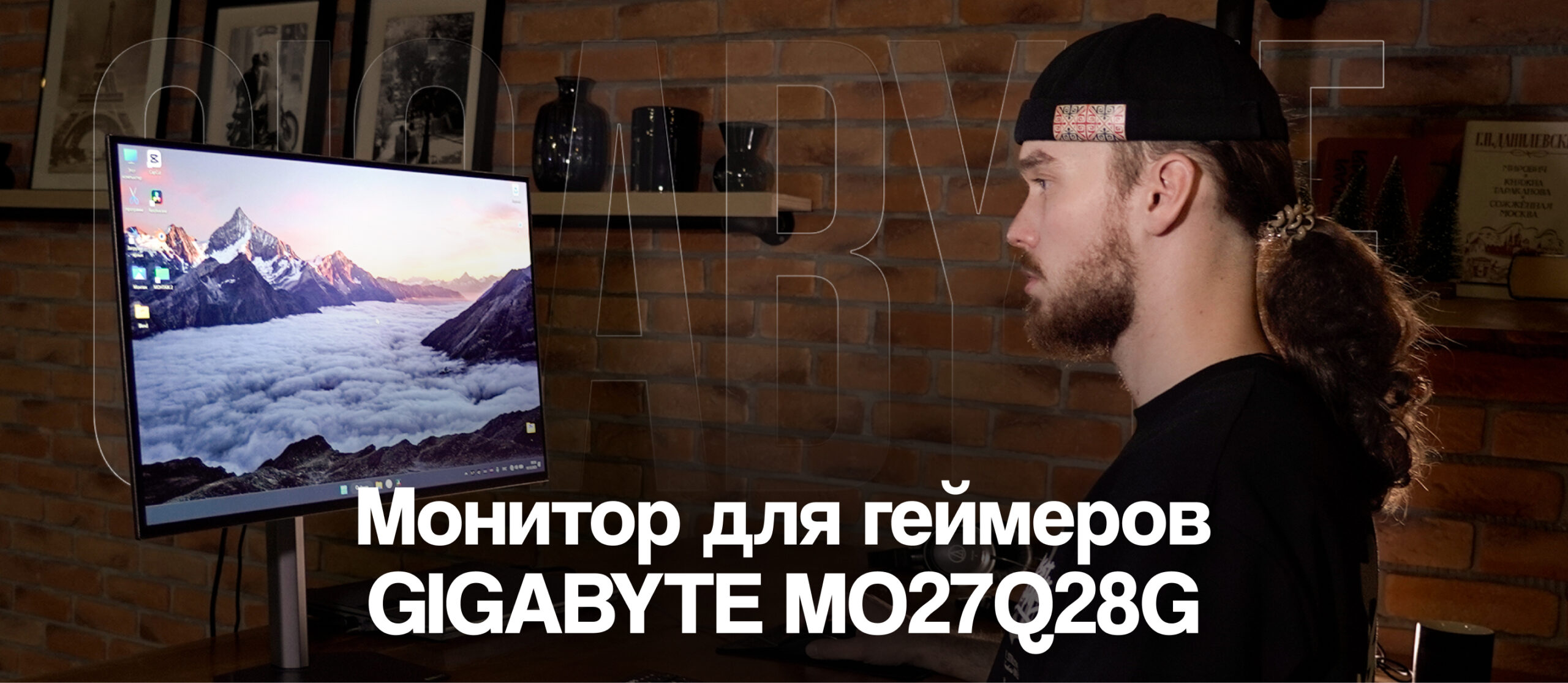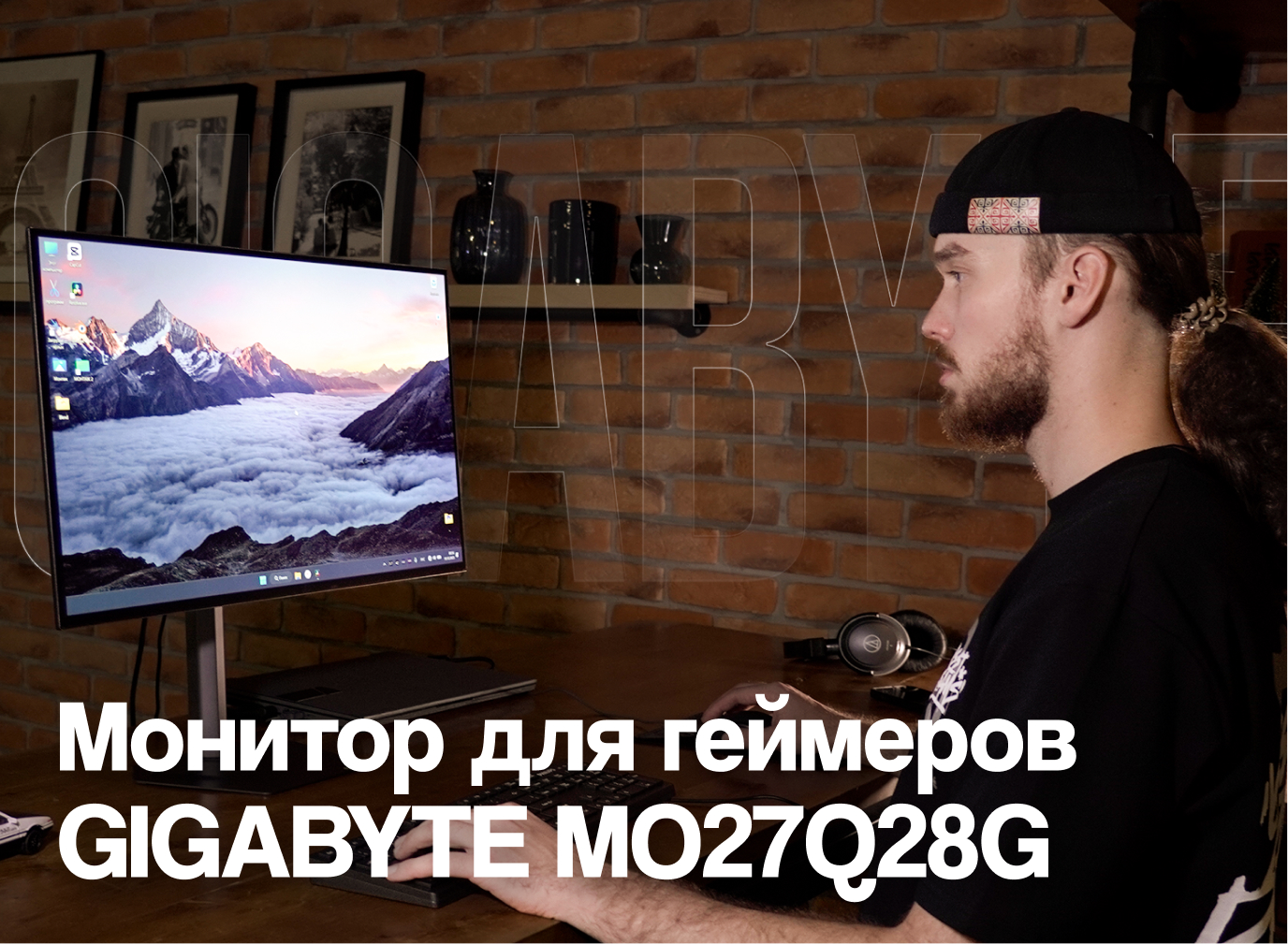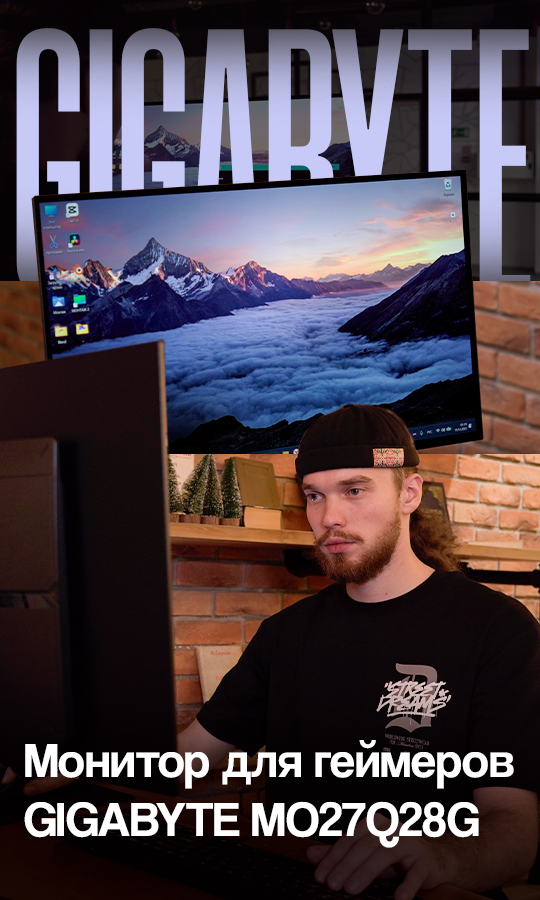The education market has been booming over the past 20 years, thanks to the rise of internet technologies like video calls, online conferences, and cashless payment systems. With tens of thousands of professionals worldwide eager to share their knowledge, platforms have sprung up to connect teachers with students. One of these platforms is Kazakhstan's very own Courstore, offering people the chance not only to earn money by sharing their knowledge but also to build their own online schools.
In an interview with Er10.media, Courstore's founder and CEO, Rauan Syzdykov, shares how the startup began, why the first try didn't pan out, and how Courstore had to start all over again.
Follow Kazakhstan’s Startup Movement in the "100 Startup Stories of Kazakhstan", a collaborative project by ER10 Media and Astana Hub. This initiative highlights the most innovative Kazakh startups, showcasing projects that stand out for their creativity and impact. Among the heroes are Astana Hub residents, as well as creators of other innovative technological products and services. The content is available in Kazakh, Russian and English.
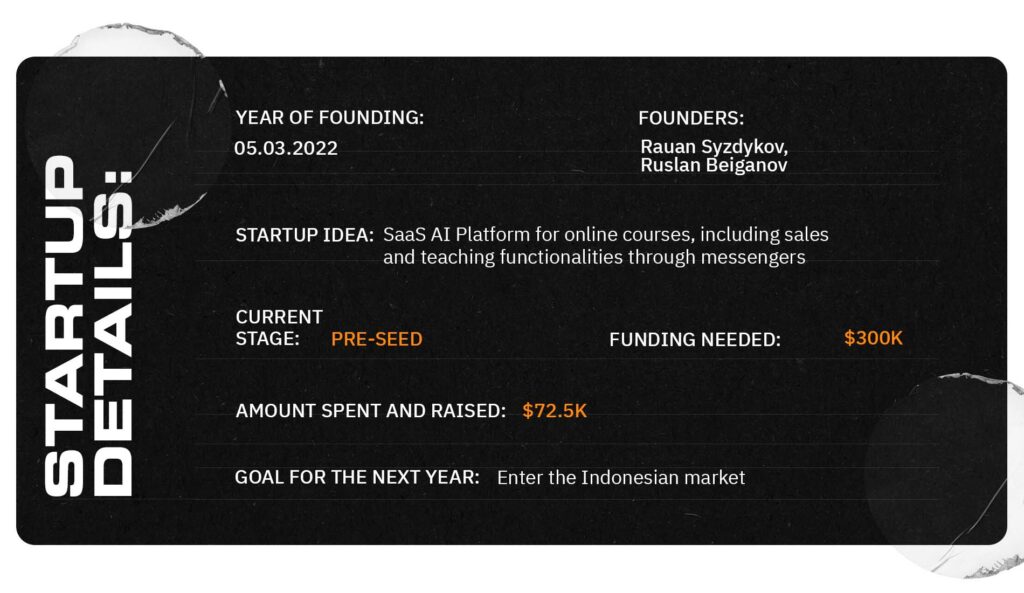
The Long Road to Entrepreneurship
– How did you become an entrepreneur?
– It didn’t happen overnight. I studied IT and graduated in 2007, facing a choice: join a company like most IT pros or become a teacher. I chose the latter. I wanted to educate the youth who would shape Kazakhstan's future. I ended up teaching for about nine years. Early on, a wise colleague warned me that if I didn’t keep upskilling, I’d be stuck knowing only Excel and Word in ten years. So, while teaching at universities, I freelanced on the side—coding and building websites. Most importantly, I coached my students for IT Olympiads, where they often excelled. This experience paved the way for my transition from teacher to entrepreneur.
In 2019, I decided to dive into business. I sold my real estate and invested in a kids' soccer school in Almaty. Things were going great until the pandemic hit, forcing us to halt operations. Luckily, I made a successful exit by selling my share. Then, I moved to Astana, where I helped build and develop Astana IT University. Later, I joined a company, and that’s when the idea of an educational services marketplace clicked. By that time, I had experience working with over 40 startups and IT projects through freelance and outsourcing gigs. With a small team, we decided to build something like Coursera or Udemy, but tailored for the CIS market.
Chasing a Dream Instead of Market Demand
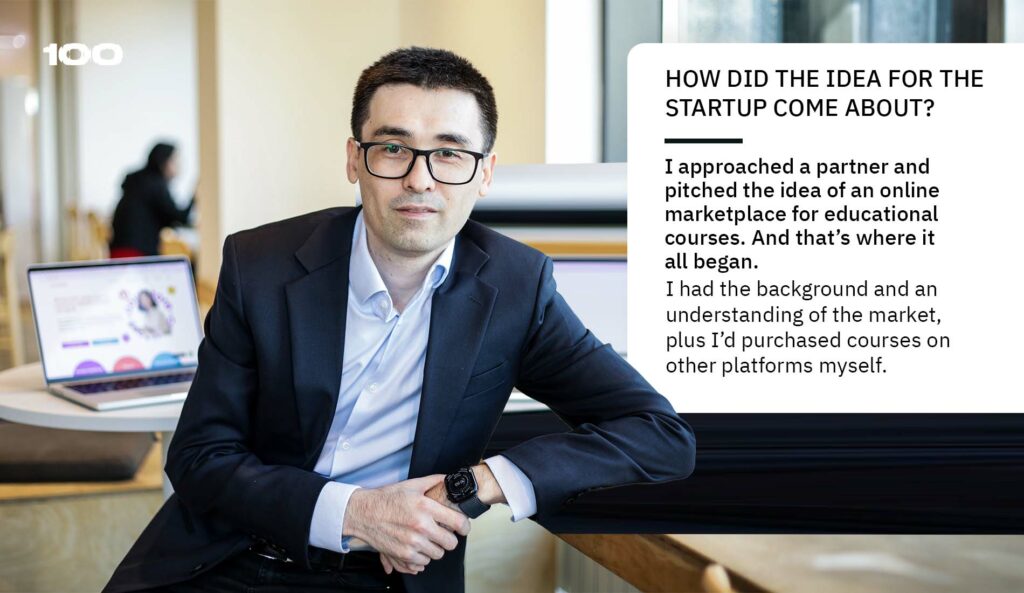
– How did the idea for the startup come about? Was it from experience, or did you spot a market gap?
– While freelancing, I built platforms for a chef and a child psychologist, who both sold their courses online. I was fascinated by how educational services could be sold this way. So, I approached a partner and pitched the idea of an online marketplace for educational courses. And that’s where it all began. I had the background and an understanding of the market, plus I’d purchased courses on other platforms myself. My dream was to build my own platform.
But here's where I went wrong: I chased a dream rather than following market demand. I skipped customer development and market research. I thought I had it all figured out, but I didn't ask potential users what they actually needed. I relied solely on my experience and intuition—and they let me down.
In 2020, we launched the first version of Courstore, inspired by Kaspi's marketplace model but for educational courses. The marketplace went live, but things didn't go as planned. This led to our first, painful failure in 2022, and we had to dissolve the team.
– Why do you think the project failed?
– The marketplace business model just didn’t work for the CIS market. Several similar projects had already launched but none had succeeded. We thought we were smarter and would succeed where others failed. But we ended up making the same mistakes as everyone else.
– What was the main reason for the failure?
– In the CIS, the supplementary education market revolves around personal brands—whether it's a well-known individual or a reputable school that the audience trusts. Celebrities often engage their followers on platforms like Instagram, and we thought that they would naturally flock to our marketplace, discover new courses, and want to buy them. However, things didn’t go as planned.
We attracted newcomers—those without an established personal brand—and found that there simply wasn't demand for them. When we tried to onboard "star" trainers and instructors, they hesitated to join a platform alongside beginners. After all, there was a stark difference in pricing: some charged 5,000 tenge, while others charged 500,000 tenge. On top of that, the marketplace model meant sharing a percentage of sales. But trainers making millions from their courses didn’t want to part with their profits. For them, using platforms like GetCourse was easier; they’d just pay a small fee to host a conference and keep all the earnings.
We invested heavily in advertising and promotion, but the results were disappointing. It was a tough lesson, but it gave us the experience we needed to rethink our approach.
A Moment of Reflection
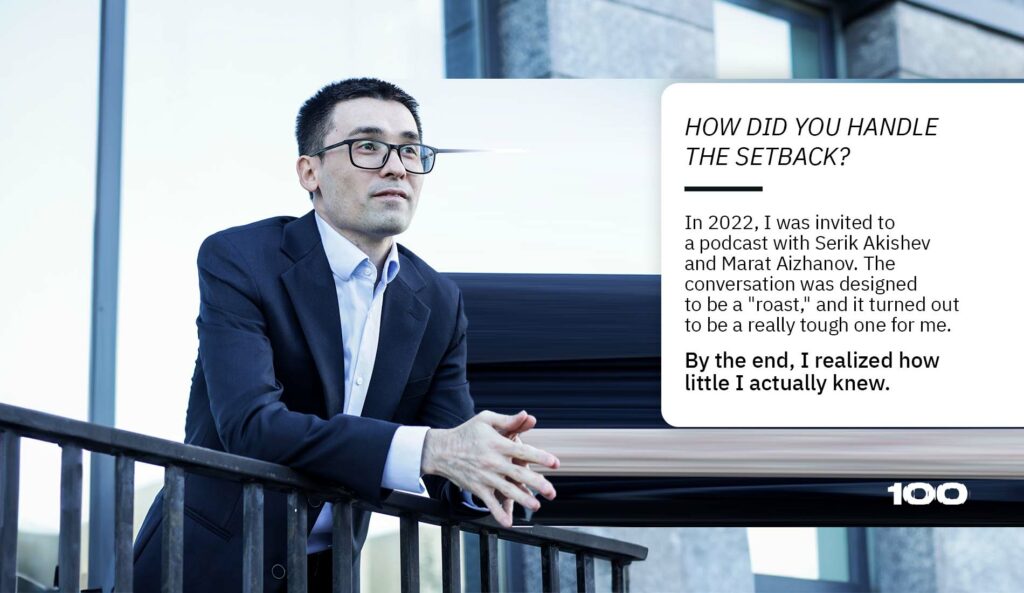
– How did you handle the setback? Was there a moment of re-evaluation?
– In 2022, I was invited to a podcast with Serik Akishev and Marat Aizhanov. The conversation was designed to be a "roast," and it turned out to be a really tough one for me. By the end, I realized how little I actually knew. I even asked Serik not to air our conversation because I appeared so lost. This experience taught me that prior knowledge and background are irrelevant when you're building something of your own. Immersing yourself in your own project is a different ball game.
Surprisingly, this was the turning point for me. In Courstore's first iteration, I had relied too heavily on my knowledge and experience, assuming that made me a successful businessman. In hindsight, my overconfidence was the root of our failure.
Recognizing our mistakes, we decided to change our business model to a subscription-based platform. Interestingly, we didn't need to make significant changes to the site structure. By simply shifting our Unique Selling Proposition (USP), we started to see sales. Our hypothesis was right: people didn’t need a marketplace; they needed a platform.
It was no easy task to reboot the business after such a setback. We had to let go of some team members, and one of our partners left. Our initial monthly revenue fluctuated between $300 and $900. Then, we hit $2,000. While these numbers might seem laughable for a company, for us, it was a success because we hadn't even earned that much before.
At the same time, I enrolled in two accelerators, adjusted our business model, and now, two and a half years later, the project has been growing steadily.
– What was your reaction when you finally saw growth after such a failure?
– Honestly, there wasn't much room for excitement. With growth, new challenges crop up at every step. Even now, I can't claim that I've "made it" or that I can rest on my laurels.
The Unique Advantages We Offer
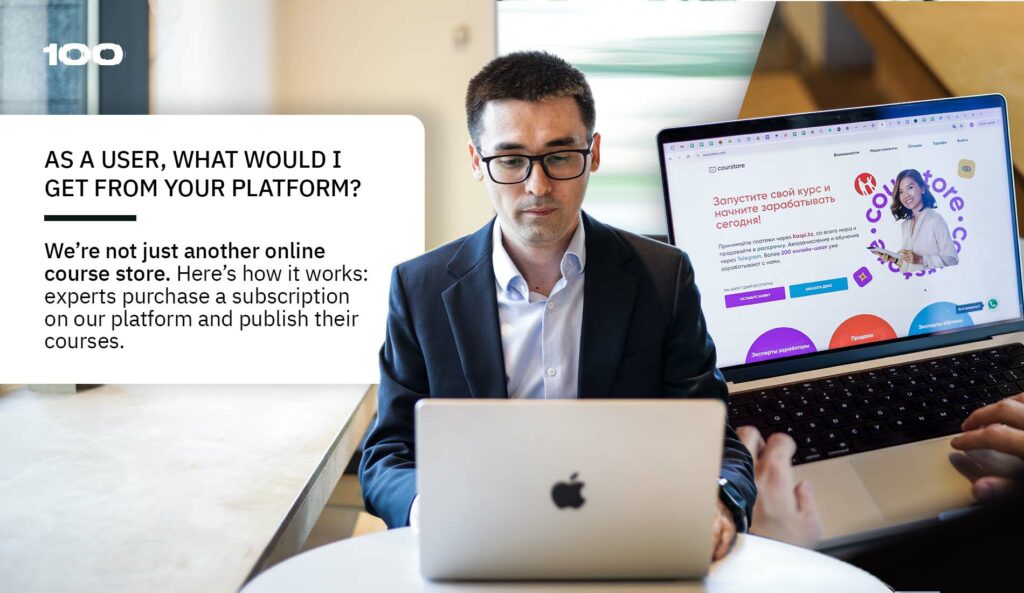
– As a user, what would I get from your platform?
– We’re not just another online course store. Here’s how it works: experts purchase a subscription on our platform and publish their courses. They have unique personal pages where they set up targeted marketing and sell their products. You, as a user, don’t browse our platform for courses; instead, you find an expert’s page through social media or ads, click the link, and land on our platform to buy and learn. We provide experts with the tools they need to teach and sell.
– What makes your platform better for experts than competitors’?
– First, we are the only platform officially integrated with Kaspi.kz. This means that once a payment is made, the client automatically gets access to the course. With competitors, the process is more tedious: you pay, provide a receipt and your details, and then wait for a curator to manually grant access. On our platform, registration and integration are handled through WhatsApp. The client buys a course and immediately receives access and a fiscal receipt via WhatsApp. It's fast, automated, and doesn’t require additional human intervention.
Second, our platform is already integrated with banks, allowing payment via bank cards. Plus, courses can be purchased in installments, making it easier to sell high-ticket items. Experts don’t have to worry about financial transactions or reporting. We not only provide a platform but also handle payment processing.
Third, we offer unlimited users and video storage. Most competitors charge extra for additional users and video storage space.
Fourth, there’s no need for additional apps. Everything runs through Telegram. We found that many users lack storage space on their smartphones. So, we created a universal Telegram bot to streamline interactions. There’s also a bot for experts, delivering key notifications, sales statistics, and other necessary info. Experts can even edit their courses via Telegram without logging into a separate system.
– Our Monetization Model
– We use a subscription-based model for experts with three tiers. For a six-month subscription, the fee is 161,900 tenge, and for a year, it's 287,000 tenge. For active experts selling their courses, these are relatively low amounts. We also offer a lifetime package for those who plan to work long-term and wish to support our startup.
Plans for Expansion
– Are you only operating locally right now?
– This spring, we expanded into the Uzbek market, raised investments, and started working successfully. We already have our first 200 students from Uzbekistan, and local experts are signing up.
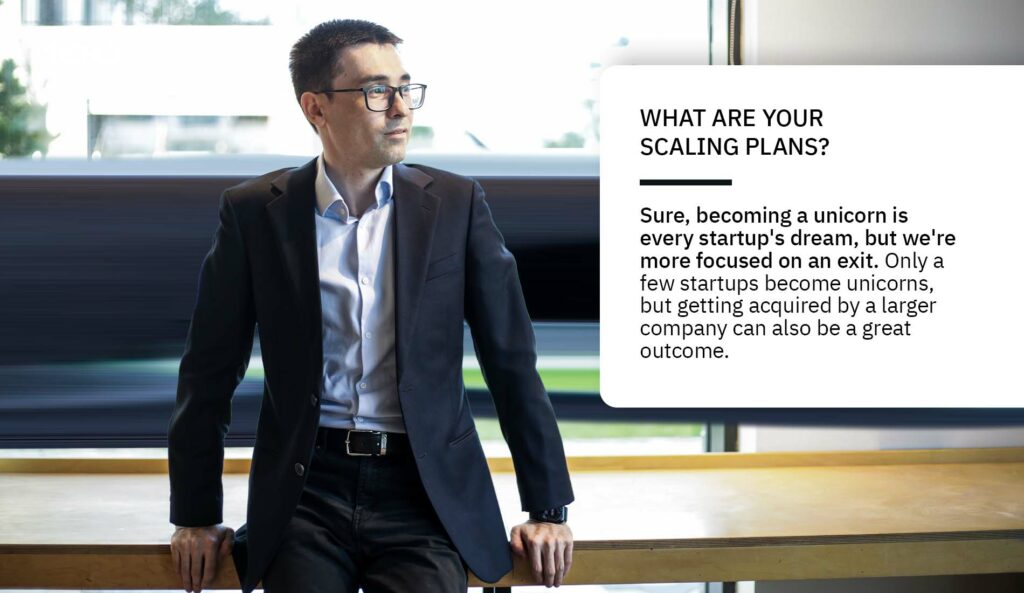
– What are your scaling plans? Are you aiming to become a unicorn?
– Sure, becoming a unicorn is every startup's dream, but we're more focused on an exit. Only a few startups become unicorns, but getting acquired by a larger company can also be a great outcome.
In terms of scaling, our next target is Southeast Asia, specifically Indonesia. We’re currently raising funds for this expansion. The markets in Kazakhstan and Uzbekistan are small, and without scaling, we'll hit a ceiling in a couple of years.
– Any concerns about competition?
– Not really. Our business model provides unique features that competitors simply don’t offer, so I’m confident we’ll carve out our market share.
– What investment are you looking for now?
– We’re currently seeking to raise $60,000 to close our current round. This fall, we plan to raise an additional $300,000 at a valuation of $3 million to support our entry into the Southeast Asian market.
– Where do you see Courstore in five years?
– In five years, we envision Courstore operating in Southeast Asia and Latin American countries, reaching a Monthly Recurring Annual Revenue (MRAR) of $100 million.
– Filtering Quality in a Saturated Market: How do you ensure the quality of courses and select experts?
– Every expert must sign an offer agreement that outlines the terms of collaboration. We immediately address the topics allowed for courses. For instance, we do not permit esoteric courses; we don’t sell pseudoscience. All courses must comply with the laws of Kazakhstan and Uzbekistan. Religious courses are only approved if authored by official representatives of traditional denominations.
If we receive complaints about a course's quality or if any violations are found, we reserve the right to disable the course unilaterally. The author is then responsible for any damages. When people use foreign platforms, their interests often aren’t protected, but we take this seriously.
Personal Insights
– Do you have a dream you’d like to realize through your startup?
– My startup is my dream. I want Courstore to become the leading platform in Central and Southeast Asia. And yes, I’d like to make both my investors and myself wealthy (laughs).

– What sport best describes your character?
– Football. We often face last-second challenges, like scoring a goal in the final moments. You need to fight to the end to get results. I once closed a major sale on New Year's Eve, December 31. That's why I always encourage my team to push until the very last minute.
– What inspires you at work? Books, movies, series?
– I don't have time for movies and series. I have about 400 tabs of movies, podcasts, and videos I want to watch, but no time to do it. Occasionally, I listen to something in the car. My motivation mainly comes from business literature.
– Any favorite books?
"Startup" and "Four Steps to the Epiphany" by Steve Blank, and "The Lean Startup" by Eric Ries. These books help avoid mistakes in business and provide a roadmap for effective growth. I highly recommend them!
– You’re currently going through the Google for Startups accelerator at Astana Hub. How useful has it been for you?
– We’ve participated in various accelerators, but Google for Startups and Most RA are by far the coolest, most high-quality, and useful – even compared to other international programs. By the way, getting into Google for Startups isn't easy. I only made it on my third attempt.
– Have you thought about the mission of your startup?
– Absolutely. We want to make education accessible. We help experts earn money while sharing their knowledge with everyone who’s interested.



